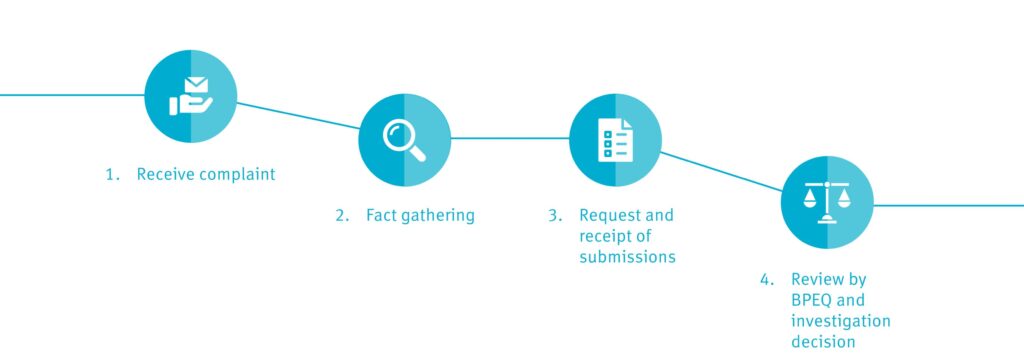05 Nov Understanding BPEQ’s complaints and investigations process
One of BPEQ’s key functions is to conduct or authorise investigations about the professional conduct of RPEQs and contraventions of the Professional Engineers Act 2002 (PE Act). BPEQ’s disciplinary and compliance investigation processes help protect the public, maintain public confidence in RPEQs, and maintain the standard of practice of RPEQs.
The article will focus on investigations about the professional conduct of RPEQs.
PROFESSIONAL CONDUCT
Complaints
The most common way that concerns about the conduct of RPEQs come to BPEQ’s attention is through a formal complaint (Figure 1). Any person who is aggrieved by that conduct can make a complaint to BPEQ about the conduct of a RPEQ in carrying out professional engineering services. Once BPEQ has received a complaint it will be assessed and clarified and a submission may be sought from the RPEQ in question. BPEQ will then decide:
-
- whether the complaint is a proper complaint; and
- if so, whether an investigation is warranted.
Own-motion investigations
BPEQ can also conduct ‘own-motion’ investigations of the conduct of RPEQs, which is an investigation that is triggered other than by a formal complaint. BPEQ regularly receives information about the conduct of RPEQs from members of the public, government, and industry and conducts or authorises investigations based on such information.
Once BPEQ receives information about the conduct of a RPEQ that raises concern about the standard of conduct of the RPEQ, it will assess and clarify that information and may seek a submission from the RPEQ. BPEQ will then decide:
-
- whether the information gives rise to a reasonable belief that an aspect of the conduct of the RPEQ may provide a ground for disciplining the RPEQ; and
- if so, whether an investigation is warranted.
Investigation process
Once BPEQ has decided to conduct or authorise an investigation of the conduct of a RPEQ, the RPEQ and, if the investigation was because of a complaint, the complainant will be notified of the decision. The RPEQ will be given the opportunity to make a submission to BPEQ or the investigator/s about the complaint and then BPEQ or its investigator/s will commence the investigation. BPEQ and its investigator/s have the power to compel the production of information from any person and to require any person to attend to answer questions and/or produce particular documents. Failure to comply with any such requirement is a criminal offence.
BPEQ always progresses its investigations as quickly as possible having regard to the nature of the matter under investigation. Once an investigation has been completed, an investigation report is prepared and the Board is asked to consider its post-investigation decision.

Figure 1. Complaints process
Post-investigation decisions
After an investigation is completed and BPEQ has considered the formal investigation report, BPEQ must make one or more of the following post-investigation decisions concerning the RPEQ the subject of the investigation:
-
- start a disciplinary proceeding against the RPEQ;
- enter into an undertaking, agreed with the RPEQ, about an aspect of the RPEQ carrying out professional engineering services;
- caution or reprimand the RPEQ;
- impose a condition, agreed with the RPEQ, on the RPEQ’s registration;
- take no further action about the matter the subject of the investigation.
Which option/s is chosen is highly dependent on the findings of BPEQ’s investigation.
Administrative actions
The administrative decision options—undertaking, caution/reprimand, registration condition, and no further action—are actioned by BPEQ itself. The particulars of all cautions, reprimands, and registration conditions are recorded on BPEQ’s register of RPEQs and decisions to caution or reprimand, and the reasons therefore, may be notified by BPEQ on its website.
BPEQ decisions to caution or reprimand are reviewable in the administrative review jurisdiction of the Queensland Civil and Administrative Tribunal (QCAT). Undertakings are confidential between BPEQ and the RPEQ. BPEQ does not have the power to impose financial penalties on RPEQs, cancel, or suspend RPEQs’ registration for the existence of a disciplinary ground. That power rest solely with QCAT.
Disciplinary proceedings
Disciplinary proceedings against RPEQs are taken in QCAT. QCAT then has the role of deciding whether BPEQ’s application is made out and a ground for disciplining the RPEQ in question is established. If QCAT decides a ground to discipline the RPEQ exists it may reprimand the RPEQ, impose a monetary penalty, or suspend or cancel the RPEQ’s registration. QCAT may also order the RPEQ to pay some or all of BPEQ’s costs of the investigation, preparing for the disciplinary proceeding, and the proceeding itself.
QCAT decisions are, unless a non-publication record is made, a matter of public record and are published on QCAT’s website, the Supreme Court Library of Queensland website, and the Australasian Legal Information Institute website. BPEQ’s current policy is to publish information about disciplinary proceedings with the RPEQ deidentified, because the main purpose of publishing the decisions is as
a learning tool for other RPEQs.
Information Privacy
Information obtained by BPEQ in performance of its investigative function is subject to privacy obligations and will only be disclosed in accordance with information privacy legislation.

 MY ACCOUNT
MY ACCOUNT

